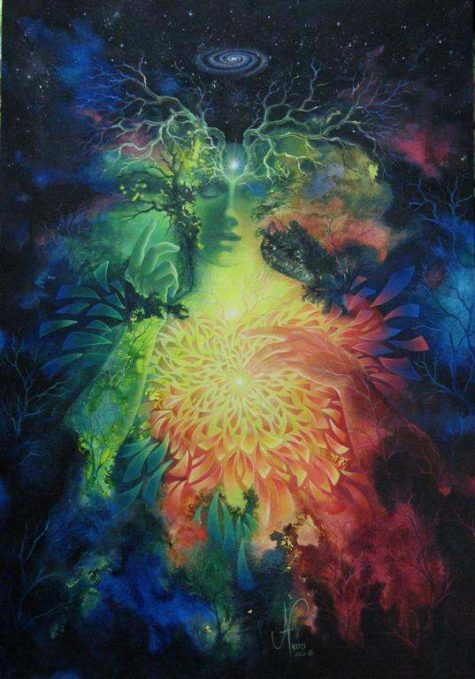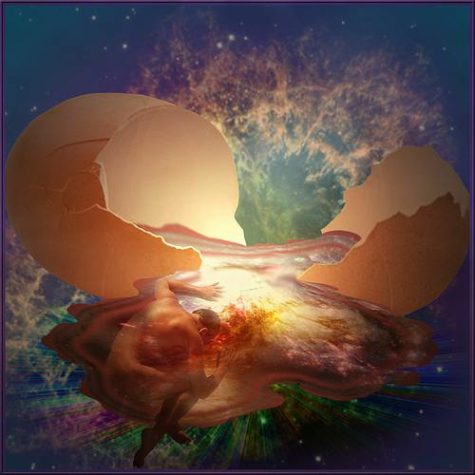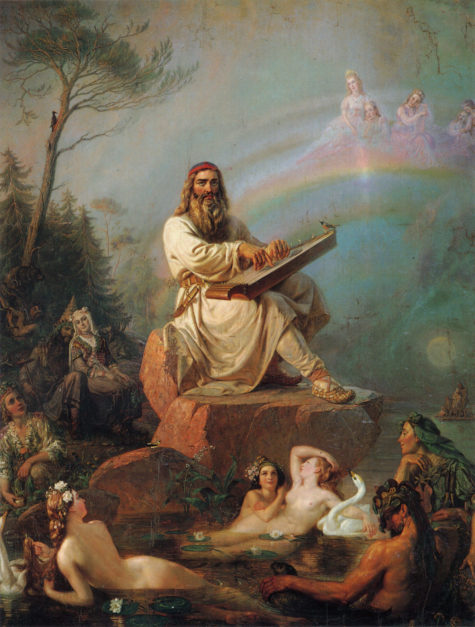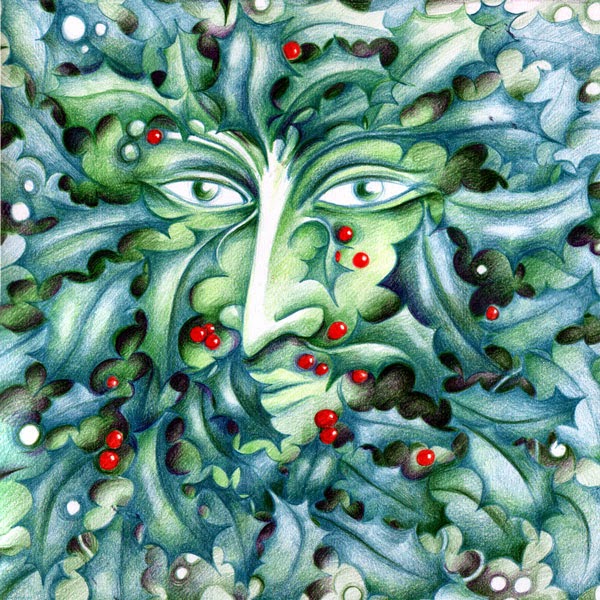Kalevala
Incantation Against Sickness
O malady, disappear into the heavens;
pain, rise up to the clouds;
inflamed vapour, fly into the air,
in order that the wind may take the away,
that the tempest may chase thee to distant regions,
where neither sun nor moon give their light,
where the warm wind does not inflame the flesh.
~from the Kalevala
The Birth of Vainamoinen
From the Kalevala, here is the story of the creation of the world, Ilmatar Daughter of Nature, and the birth of her son, Vainamoinen.
Lonely come the nights upon us,
Lonely dawn the brightening days;
Lonely born was Vainamoinen,
All alone, the poet immortal,
From the beautiful who bore him,
From his mother, Ilmatar –
She, the virgin of the air,
Beautiful maiden. Nature’s child,
Long maintained in holiness
Her eternal maidenhood
In the far-horizoned heavens,
Level meadows of the air.
But in time she wearied of it,
Was estranged from this odd living,
Always being by herself,
Ever living as a virgin
In those far-horizoned heavens,
In those vast and empty spaces.
So at length she then descended
To the seawaves down below,
To the open clear sea surface
Out upon the open ocean.
Suddenly a storm wind blew,
Out of the east an angry blast
Blew the water to a foam
Heaving up the rollers high.
By the wind the maid was rocked,
On a wave the maid was driven
Round about the blue sea surface
By the whirling whitecaps lifted
Where her womb the wind awakened
And the sea-foam impregnated.
Thus a full womb now she carried,
Long she bore her burdened belly,
Seven hundred years she bore it
For nine lifetimes of a man,
Yet the borning was unborn,
Still the fetus undelivered.
As the mother of the water
Aimlessly the virgin drifted:
She swam eastward, she swam westward,
She swam south and northwestward,
Swimming round the whole horizon
In the anguish of her birth pangs,
In her belly’s bursting pains.
Yet the borning was unborn,
Still the fetus undelivered.
Then she fell to weeping softly,
Said a word and spoke out thus:
“Woe is me, the water wanderer,
Luckless girl, misfortune’s child!
Now already I’m in trouble,
Shelterless beneath the sky,
Ever rocking on the seawaves
To be cradled by the wind,
To be driven by the billows
On these far-extending waters,
Endlessly repeated billows.
“Better had it been for me
To have stayed the airy virgin
Than to be as I am now
Drifting as the water-mother.
Its too cold for me to stay here,
Painful to be drifting here,
Wallowing in this watery waste.
“0 thou Ukko, lord of all,
Hear me, thou the all-sustainer:
Come, 0 come where thou art needed;
Come, 0 come where thou art called!
Loose the maiden from her misery
And the woman from her womb-ache;
Come thou quickly, soon arriving
Where thy help is sooner needed.”
Then a bit of time passed over
Like a tiny rash of rain,
When a scaup, the honest bird,
Came on hovering here and there
Searching for a nesting place,
For a spot to build her home on.
She flew eastward, she flew westward,
Flew to northwest and to southward
But she cannot find a spot
Even in the worst of places
Where to build her needful nest,
Where to take up her abode.
Hovering, fluttering back and forth
Thus she thought and pondered it:
“Must I make my home on wind,
Build my hut upon the billows
Where the wind can blow it over
Or a wave can wash away?”
So the mother of the water,
Water mother, airy maiden,
Raised her knee above the surface
And her shoulder from the wave
As a refuge for the scaup
And a welcome nesting place.
Then that scaup, the lovely bird,
Fluttering round and hovering over
Spied the water-mother’s knee
Lifted from the sea’s blue surface;
Took it for a grassy tussock
Or a tuft of new-grown turf.
Flies about, flitting here and there,
Settles on the lifted kneecap.
It is there she builds her nest,
There she laid her golden eggs –
Six were the golden eggs she laid,
But the seventh was of iron.
She began to hatch the eggs there,
Heating up the lifted kneecap;
Brooded one day, brooded two days,
Even on the third day brooding.
Then the mother of the water,
Little mother, airy maiden,
Felt the rising heat upon her,
Felt as if her skin were scorching,
Thought her kneecap was on fire,
That her very veins were melting.
All at once she jerked her knee,
Agitating every member,
And the eggs rolled in the water
To the tumbling of the tides;
Into bits the eggs were broken,
Shattered into crumbs and pieces.
But the eggs and pieces were not
Mixed up with the mud and water
For at once the crumbs grew comely
And the pieces beautiful.
One egg’s lower half transformed
And became the earth below,
And its upper half transmuted
And became the sky above;
From the yolk the sun was made,
Light of day to shine upon us;
From the white the moon was formed,
Light of night to gleam above us;
All the colored brighter bits
Rose to be the stars of heaven
And the darker crumbs changed into
Clouds and cloudlets in the sky.
Quickly now the time goes forward
As the hurrying years pass by
While the newborn sun is shining
And the newborn moon is gleaming.
Still the mother goes on swimming,
Water mother, airy maiden,
Swimming on those peaceful waters
Over misty seawaves wandering.
Before her flowed the liquid deep,
Behind her shone the empty heaven.
In the ninth year, tenth of summers,
Raised her head out of the sea,
Lifts her crown above the water;
Set to work on her creations,
Hastens on her handiwork,
Out upon the clear sea surface,
Out upon the open ocean.
Where she gave her hand a turn
There she put the capes in order;
Where her foot struck bottom, there
Grottoes for the fish were formed;
Where the bubbles reached the surface
There the deeps were made still deeper.
Where her side had scraped the land
There the level shores appeared;
Where she turned her foot to landward
There the salmon grounds were formed,
And wherever her head touched land
There the broad bays opened out.
Swimming farther out from shore
She halted on the smooth sea surface
Where she made the little islands.
Then she raised the hidden reefs
Where the grounded ships would founder,
Many a seaman lose his life.
Now the islands were in order
And the small isles of the sea;
Pillars for the sky were planted,
Lands and continents created;
On the rocks the writs were written”
And the signs drawn on the cliffs.
Yet Vainamoinen is unborn,
Poet eternal not emerged.
Old reliable Vainamoinen
Traveled in his mother’s womb,
Traveled there for thirty summers
And as many winters too
On the ocean now so peaceful
In that misty world of water.
He is pondering, he is thinking,
How to live or how survive
In this dismal hiding place,
In this narrowest of dwellings
Where he never saw the moon,
Never got a glimpse of sunlight.
So he speaks out in these words,
Says it in these sentences:
“Free me. Moon, and Sun, release me!
Thou, Great Bear, do ever guide me,
Lead a man here through strange doors,
Through these unfamiliar gates.
Release me from this narrow nest,
From this shut-in dwelling place!
Guide the traveler to the land,
Child of mankind to the open
To behold the moon in heaven
And to wonder at the daylight,
Get to know the Great Bear’s grandeur
Or just to stare up at the stars!”
Since the moon did not arrive
Nor the sun come to release him,
Alienated from his birth time,
Impatient of this dull existence,
He pushed against his prison lock
Pressing with his nameless finger,
Slid the bony bolt aside,
With his left toe opened it;
Scrabbling with his nails he came
Crawling through the exit door.
Headlong in the sea he tumbled
With a hand-turn in the waves.
There the man was left alone
In the rough care of the billows.
There he floated for five years,
Six, seven, even eight years,
Stopped at last upon the surface
There beside a nameless headland,
On a treeless continent.
Struggling up with knee and elbow
He stood up to see the world:
To behold the moon in heaven
And to wonder at the daylight,
Get to know the Great Bear’s grandeur
Or just to stare up at the stars.
That was the birth of Vainamoinen.
Such the daring poets descent
From the beautiful who bore him,
From his mother, Ilmatar.
Wainamoinen’s Harp Songs
The Kalevala recounts a battle of wits between three wizard brothers and the witch goddess, Louhi. It is a treasure trove of ancient shamanistic practices and spells. Here’s a reading:
Wainamoinen’s Harp Songs
Then the singer of Wainola
Took the harp of his creation,
Quick adjusting, sweetly tuning,
Deftly plied his skillful fingers
To the strings that he had fashioned.
Now was gladness rolled on gladness,
And the harmony of pleasure
Echoed from the hills and mountains:
Added singing to his playing,
Out of joy did joy come welling,
Now resounded marvelous music,
All of Northland stopped and listened.
Every creature in the forest,
All the beasts that haunt the woodlands,
On their nimble feet came bounding,
Came to listen to his playing,
Came to hear his songs of joyance.
Leaped the squirrels from the branches,
Merrily from birch to aspen;
Climbed the ermines on the fences,
O’er the plains the elk-deer bounded,
And the lynxes purred with pleasure;
Wolves awoke in far-off swamp-lands,
Bounded o’er the marsh and heather,
And the bear his den deserted,
Left his lair within the pine-wood,
Settled by a fence to listen,
Leaned against the listening gate-posts,
But the gate-posts yield beneath him;
Now he climbs the fir-tree branches
That he may enjoy and wonder,
Climbs and listens to the music
Of the harp of Wainamoinen.
~RUNE XLI.
The epic poem, Kalevala, is celebrated by the Finns this day (February 28) with parades and readings from the poem. The Kalevala is a 19th century work of epic poetry compiled by Elias Lönnrot from Finnish and Karelian oral folklore and mythology. The above translation is by John Martin Crawford,
James Cheney: Invocation To The Dark Mother
Daniel: Prayer Before The Final Battle
blessed obyno: Queen of Ghosts
blessed obyno: Queen of Ghosts
Caerlion Arthur: The Great, Bloody and Bruised Veil of the World






